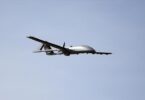MOSCOW (AFP): Russia successfully docked its troubled laboratory module Nauka with the International Space Station on Thursday after more than a decade of delays, the country’s space agency Roscosmos said.
The mission comes as Russia seeks to boost its space industry, which has fallen behind since the collapse of the Soviet Union and struggles to keep up with competition from the United States.
“There is contact!!!” Roscosmos chief Dmitry Rogozin said on Twitter as Russia completed the first docking of an ISS module in 11 years.
Images released by Roscosmos showed the new addition to the Russian segment of the ISS docking with the nadir (Earth-facing) port of the Zvezda service module at 1329 GMT.
It will now take several months and multiple spacewalks to fully integrate the module with the space station.
The Nauka module blasted off last week from the Baikonur cosmodrome in Kazakhstan, carried by a Russian Proton rocket.
The launch was closely watched by the European Space Agency as the module was travelling with the European Robotic Arm, the first robot arm that will be able to work on Russia’s ISS segment.
DECADES IN THE MAKING
Nauka — which means “science” in Russian — will be primarily used for research and storing laboratory equipment.
It will also provide more storage space, new water and oxygen regeneration systems and improved living conditions for cosmonauts of the Russian ISS sector.
The Nauka multipurpose laboratory module was conceived as early as the mid-1990s when it was intended as a back-up for the Russian control module Zarya.
It was later repurposed as a science module but joined a line-up of stagnating Russian space projects that have fallen victim to funding problems or bureaucratic procedures.
The launch of the 20-tonne Nauka — one of the largest modules on the ISS — was initially scheduled for 2007 but has been repeatedly delayed over various issues.
While last week’s launch was succesful, Nauka experienced several “hiccups in orbit” during its eight-day journey to the ISS, the European Space Agency said.
“We won’t lie… We had to worry for the first three days,” Rogozin told journalists after Nauka had docked, according to the RIA Novosti news agency.
Nauka replaces the long-serving Pirs docking module, which joined the ISS in 2001 as a temporary addition but ended up staying in service for two decades.
Making room for Nauka, Pirs detached from the ISS earlier this week, mostly burning up in the Earth’s atmosphere and with its remains falling into the Pacific Ocean.
RUSSIA’S FUTURE ON ISS
Launched in 1998 and involving Russia, the United States, Canada, Japan, and the European Space Agency, the ISS is one of Russia’s few remaining collaborations with the West as tensions continue to simmer over a litany of issues.
The ISS is divided into two sections: the Russian Orbital Segment operated by Russia, and the remainder run by the US and other partners.
For years, US space agency NASA was reliant on Russia to ferry its astronauts to the ISS and paid millions of dollars for a seat on a Soyuz rocket.
But last year Russia lost its monopoly for manned flights to the ISS after the succesful mission of Space X, the company belonging to US billionaire Elon Musk.
In April, Russia said it is considering withdrawing from the ISS programme citing ageing infrastructure, and is planning to launch the first core module of a new orbital station in 2025.
Russia has announced a series of projects in recent years, including a mission to Venus and a station on the moon, but as the Kremlin diverts funding in favour of military ventures, analysts question the feasibility of these ambitions.






